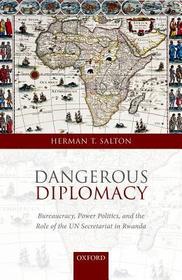
Dangerous Diplomacy
Bureaucracy, Power Politics, and the Role of the UN Secretariat in Rwanda
- Publisher's listprice GBP 100.00
-
47 775 Ft (45 500 Ft + 5% VAT)
The price is estimated because at the time of ordering we do not know what conversion rates will apply to HUF / product currency when the book arrives. In case HUF is weaker, the price increases slightly, in case HUF is stronger, the price goes lower slightly.
- Discount 10% (cc. 4 778 Ft off)
- Discounted price 42 998 Ft (40 950 Ft + 5% VAT)
Subcribe now and take benefit of a favourable price.
Subscribe
47 775 Ft

Availability
printed on demand
Why don't you give exact delivery time?
Delivery time is estimated on our previous experiences. We give estimations only, because we order from outside Hungary, and the delivery time mainly depends on how quickly the publisher supplies the book. Faster or slower deliveries both happen, but we do our best to supply as quickly as possible.
Product details:
- Publisher OUP Oxford
- Date of Publication 10 August 2017
- ISBN 9780198733591
- Binding Hardback
- No. of pages310 pages
- Size 242x168x26 mm
- Weight 626 g
- Language English 0
Categories
Short description:
This book carries out an in-depth reassessment of the role of the UN Secretariat during the Rwandan genocide, focusing in particular on decision-making processes in New York.
MoreLong description:
Dangerous Diplomacy reassesses the role of the UN Secretariat during the Rwandan genocide. With the help of new sources, including the personal diaries and private papers of the late Sir Marrack Goulding--an Under-Secretary-General from 1988 to 1997 and the second highest-ranking UN official during the genocide--the book situates the Rwanda operation within the context of bureaucratic and power-political friction existing at UN Headquarters in the early 1990s. The book shows how this confrontation led to a lack of coordination between key UN departments on issues as diverse as reconnaissance, intelligence, and crisis management. Yet Dangerous Diplomacy goes beyond these institutional pathologies and identifies the conceptual origins of the Rwanda failure in the gray area that separates peacebuilding and peacekeeping. The difficulty of separating these two UN functions explains why six decades after the birth of the UN, it has still not been possible to demarcate the precise roles of some key UN departments.
Herman T. Salton's book is a work of great ethical and intellectual depth, as well as of interpersonal and organizational insight, which is genuinely exceptional, original and of superlative quality - it is a major contribution to literature on the UN.
Table of Contents:
Foreword
Introduction: Bureaucracy, Power, and Tragedy in Rwanda
Part I: Structures
Department of Peacekeeping Operations
Department of Political Affairs
United Nations Assistance Mission for Rwanda
Secretary-General's Office
Security Council
Part II: Processes
Bureaucracy
Intelligence
Leadership
Morality
Peacebuilding
Conclusion: The UN Secretariat Yesterday and Today




